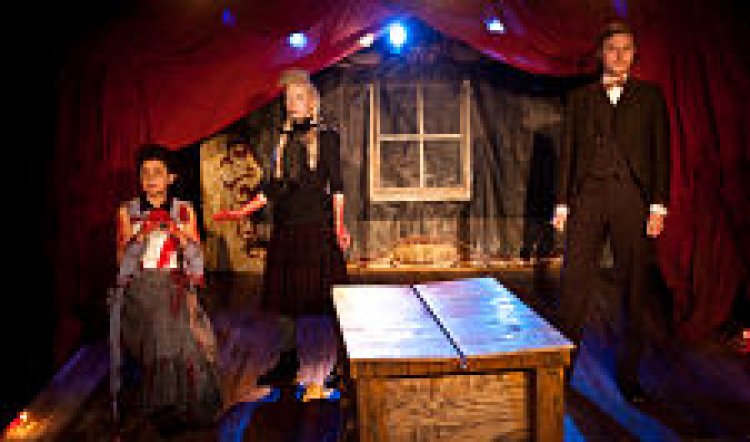
QUACK
Quack, Griffin Theatre Company at SBW Stables Theatre, 27 August-2 October, 2010. Photos: Alex Vaughan
Broad and bawdy ideas are sure to be in the wind when the heroine of the piece is called Fanny (Aimee Horne). And when she turns out to be a wall-eyed young thing with a wild streak as wide as Deadwood, it’s pretty clear the night will turn weird and spooky before it’s over.
Quack, Ian Wilding’s new play, has nothing to do with feathered types and everything to do with ratbags, carpetbags and snake oil. He sets out to explore the underside of ordinariness in an outback mining town sometime around the turn of the last century, when gentle folk were rare and life was short and brutish – to the accompaniment of banjo and fiddle.
Quack begins with great promise: there is something unsettlingly familiar about Doc Littlewood (Chris Haywood) and his turns of phrase. While slurping on a patent syrup and extolling the virtues of reverse orcheotomies to the impotent burghers of the unnamed town, he cuckoos on about being “comfortable and relaxed” – and other white picket fence-style utterances of blessed memory.
And if you’re thinking of whipping off to Wikipedia in search of the meaning of “orchieotomy”, be assured that it’s the medical term for castration and keep reading. Doc Littlewood has apparently devised a surgical procedure to give old men a little of what they fancy by implanting the precious organs, purchased or otherwise purloined from importunate young men. In this instance it’s Rodney (also played by the irrepressible Aimee Horne) who is closer to moron than man to the point where you’d have to wonder whether his brains are smaller than his balls; or whether he’s just a normal young buck after all.
Not surprisingly, Fanny, who appears to be an orphan or perhaps the product of an unfortunate liaison, is desperate to leave town and make her way by becoming an author. She has written a short story and it has been accepted for publication in a quarterly; this last bit of information strikes fear into the shriveled heart of Nancy her mother (Jeanette Cronin) who can conceive of nothing better for a young woman than a poorly-hung and fat-walleted old husband. (also Cronin in a rambunctious bit of doubling up).
Dashing and modern Dr Waterman (Charlie Garber) arrives in town and is, of course, the catalyst for change. A fatal pestilence has settled upon the townsfolk – unseen but constantly heard in unearthly moaning and carrying on – and Dr Waterman divines that it’s the old quack’s remedies that might be to blame; in particular, bad water. (And how bad and why you don’t really want to know.) Slowly it becomes clear that zombies and nasty people arriving on boats are what ails the town.

Lurking in the subtext of this allegorical semi-comedy reading of modern society is a neat reference to the apathy and lack of engagement that characterizes the slacker country. No hurling of Parisian cobblestones, nor rioting in the streets of Athens – just a mob whose greatest ambition is to have five en suites and to eat one another. And meanwhile, carry on alarming in an ungodly fashion (sound design and composition David Heinrich).
Quack is ambitious and its refusal of realism and grab at theatricality is exhilarating. Initially it suggests something special is going to happen. This is helped by William Bobbie Stewart’s design of a creaky-floored vaudeville stage complete with flickering footlights (Bernie Tan) and the horribly badly painted tableaux of old time music hall. Chris Mead directs the complex action and fast-swapping characters with enough clarity and vigor to disguise how quickly the play itself loses steam and begins to meander.
Whether the play is too clever by half or just not clever enough is hard to work out. The actors throw themselves into their roles with conviction and gusto. Aimee Horne, in particular, is a revelation of bold yet restrained characterization; Garber manages creepy and charming in equal measure and without apparent effort, while Cronin and Haywood are indecorous, broadly drawn pantomime figures that, in the main, work well.
In the end, however, Quack loses its way and wanders for at least 20 minutes longer than it should. And ironically, the more way out and wacky it strives to become, the more it founders and finally sinks into the ordinary and everyday. It was a good idea, but someone should then have said, “Okay, and then what?” – that’s the question that needed answering before “The end” was written at the foot of the page.
If you’re really into zombie stuff, however, you might enjoy it more and you would probably like to know that the Quack season includes post-show screenings of classic zombie movies such as George Romero's Night of the Living Dead, Dawn of the Dead and Day of the Dead; all-day marathons of the Deadwood series; exclusive screenings of episodes of A Country Practice and a post-show artists' talk. For more information, see griffintheatre.com.au.



